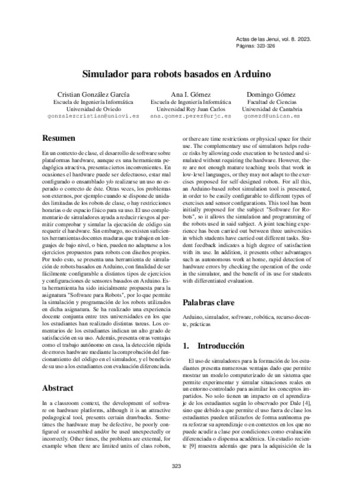Simulador para robots basados en Arduino
Autor(es) y otros:
Palabra(s) clave:
Education
Arduino
Simulator
Robotics
Software
Fecha de publicación:
Citación:
Descripción física:
Resumen:
In a classroom context, the development of software on hardware platforms, although it is an attractive pedagogical tool, presents certain drawbacks. Sometimes the hardware may be defective, be poorly configured or assembled and/or be used unexpectedly or incorrectly. Other times, the problems are external, for example when there are limited units of class robots, or there are time restrictions or physical space for their use. The complementary use of simulators helps reduce risks by allowing code execution to be tested and simulated without requiring the hardware. However, there are not enough mature teaching tools that work in low-level languages, or they may not adapt to the exercises proposed for self-designed robots. For all this, an Arduino-based robot simulation tool is presented, in order to be easily configurable to different types of exercises and sensor configurations. This tool has been initially proposed for the subject "Software for Robots", so it allows the simulation and programming of the robots used in said subject. A joint teaching experience has been carried out between three universities in which students have carried out different tasks. Student feedback indicates a high degree of satisfaction with its use. In addition, it presents other advantages such as autonomous work at home, rapid detection of hardware errors by checking the operation of the code in the simulator, and the benefit of its use for students with differentiated evaluation.
In a classroom context, the development of software on hardware platforms, although it is an attractive pedagogical tool, presents certain drawbacks. Sometimes the hardware may be defective, be poorly configured or assembled and/or be used unexpectedly or incorrectly. Other times, the problems are external, for example when there are limited units of class robots, or there are time restrictions or physical space for their use. The complementary use of simulators helps reduce risks by allowing code execution to be tested and simulated without requiring the hardware. However, there are not enough mature teaching tools that work in low-level languages, or they may not adapt to the exercises proposed for self-designed robots. For all this, an Arduino-based robot simulation tool is presented, in order to be easily configurable to different types of exercises and sensor configurations. This tool has been initially proposed for the subject "Software for Robots", so it allows the simulation and programming of the robots used in said subject. A joint teaching experience has been carried out between three universities in which students have carried out different tasks. Student feedback indicates a high degree of satisfaction with its use. In addition, it presents other advantages such as autonomous work at home, rapid detection of hardware errors by checking the operation of the code in the simulator, and the benefit of its use for students with differentiated evaluation.
Descripción:
Jornadas sobre Enseñanza Universitaria de la Informática (29ª. 2023. Granada)
ISSN:
Colecciones
- Informática [875]
- Ponencias, Discursos y Conferencias [4233]
Ficheros en el ítem





